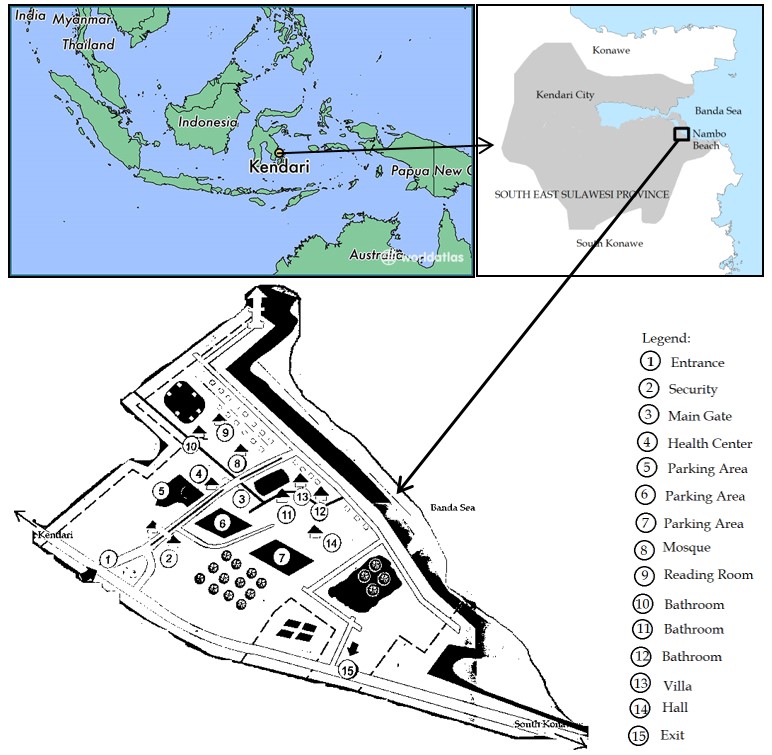Impact of Tourism Policy Implementation in the Development of Regional Tourism Strategic Area (Case Study: Nambo Beach in Kendari City, Indonesia)
Abstract
This paper aims to analyse the impact of national and regional tourism policy implementation in the development of Nambo Beach tourist destination as one of the Regional Tourism Strategic Area (RTSA) in Kendari City, Southeast Sulawesi, Indonesia. Three baselines of government policy are discussed in this paper, namely 2009, 2011 and 2016 baseline due to the government regulation issued in these specific years. Government policy is required regarding improvement of amenity and accessibility of a tourist destination. The method of the research is literature study and observation in the tourist site, the Nambo Beach. In the literature study we conducted analysis the regulation which supported the tourism sector in both national and regional level. Through field survey, we collected primary data from field survey and secondary data from Kendari Statistic Agency regarding the development of tourism infrastructure in and outside the Nambo Beach. The result showed that the regulation established in 2009 and 2011 for national level and 2016 at the regional level have been supporting the development of tourism sector in Kendari particularly the Nambo Beach RTSA as indicated by the growing of the facilities in the Nambo Beach at least 60% as well as the external facilities such as hotels and rooms which growth up in average more than 100% and roads infrastructure was about 150% in the last ten years.
References
BPS Kota Kendari. (2019). Kendari Statistic Agency Publication Year of 2018.
Indonesia Ministry of State Secretary (IMSS). (2009). Indonesia National Act No. 10 Year of 2009 concerning Indonesia Tourism Regulation.
Indonesia Ministry of State Secretary (IMSS). (2011). Government Regulation No. 50 Year of 2011 concerning the Indonesia Master Plan for National Tourism Development 2010-2025.
Jovanović, S. and Ilić, I. (2016). Infrastructure as Important Determinant of Tourism Development in the Countries of Southeast Europe, Ecoforum, Volume 5, Issue 1 (8).
Kendari Tourism Agency (KTA), Kendari Mid Term Plan on Tourism 2012-2017.
Lickorish, L. J., & Jenkins, C. L. (1997), An Introduction to Tourism, Butterworth-Heinemann, Oxford, ISBN 0 7506 1956 2
Mandić, A., Mrnjavac, Z., & Kordić, L. (2018). Tourism Infrastructure, Recreational Facilities and Tourism Development. Tourism and Hospitality Management, 24(1). https://doi.org/10.20867/thm.24.1.12
Penrose, J. (2011). Government Tourism Policy, Department for Culture, Media and Sport of Great Britain.
Puspita, S. (2018). Six Steps of Indonesia Government to Increase Tourism Sector, https://travel.kompas.com
Southeast Sulawesi Regulation Board (SESRB). (2016). Provincial Regulation No. 5 Year of 2016 concerning the Master Plan for Regional Tourism Development in Southeast Sulawesi Province for 2016 to 2031.
Suparwoko (2012). Tourism Development in Indonesia, Towards Responsible Tourism: A Community-based Approach to Tourism Development in Indonesia Chapter: IV, Publisher: LAP Lambert Academic Publishing.
Webster, C., & Ivanov, S. (2014). Transforming competitiveness into economic benefits: Does tourism stimulate economic growth in more competitive destinations? Tourism Management, 40, 137-140. https://doi.org/10.1016/j.tourman.2013.06.003


This work is licensed under a Creative Commons Attribution 4.0 International License.
Copyright for this article is retained by the author(s), with first publication rights granted to the journal.
This is an open-access article distributed under the terms and conditions of the Creative Commons Attribution license (http://creativecommons.org/licenses/by/4.0/).









1.png)














